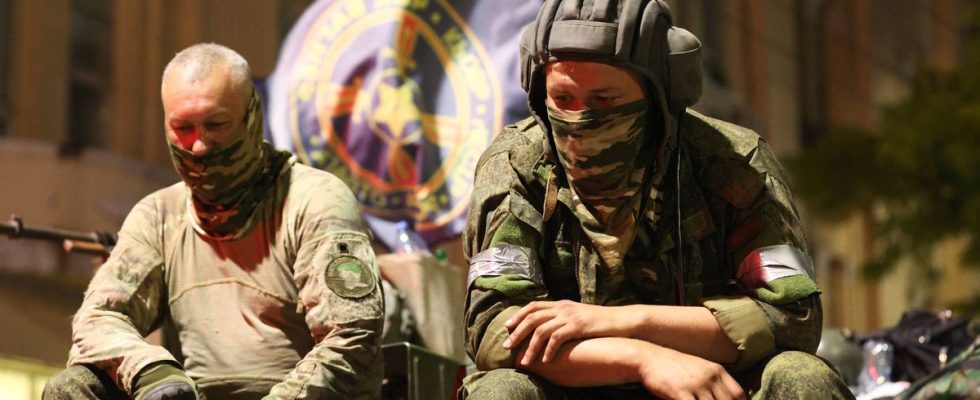As brief as it was unexpected, the uprising of the Wagner group against Moscow fell like a blast on Saturday evening. For a few hours, eyes usually focused on Kiev and Zaporozhye shifted slightly to the northeast, so much so that the “war in Ukraine” gave way to “Wagner’s rebellion” in many media. The parenthesis is now closed, but the damage is there.
Evguéni Prigojine in Belarus, Vladimir Putin “challenged” and mocking Volodymyr Zelensky… Without bringing down the Russian state, the tremors of the Wagner earthquake were strong. What will become of the rebel structure? Is Vladimir Putin weakened? Can Ukraine take advantage of this on the front? 20 minutes discussed the consequences of this episode with Isabelle Facon, senior researcher at the Foundation for Strategic Research and specialist in Russian defense policies.
Can the activities of Yevgeni Prigojine and the Wagner group continue?
For the first concerned by this failure, the blow is hard. “He is in disgrace”, establishes Isabelle Facon. Condition sine qua non to his judicial amnesty, he is now a refugee in Belarus, on the proposal of President Alexander Lukashenko. An exile that will “complicate his life” to lead the Wagner group, “a structure that also makes money”. In the longer term, his personal future is dotted. “A large part of its means and its surface area is reduced, we cannot exclude that something will happen to it in the coming months”, warns the expert, stressing that “we have already seen the Russian authorities have more radical positions against certain opponents”, from prison to falling down the stairs.
By abdicating, Evguéni Prigojine still saved his men, who also escaped any legal proceedings. “The prospect of bringing his troops under control” at the Ministry of Defense “didn’t please him very much”, which is one of the reasons for his rebellion. The failure is complete on this line. “Part of its mercenaries will be integrated” by the Russian army, which encounters “a lack of human resources on the ground”. The experience of these men, who have achieved significant successes for Russia, may prove crucial for Vladimir Putin’s troops. As for the mercenaries who would like to remain faithful to Prigojine, “avatars can be created”, but “the Wagner group as we knew it will not remain intact”, indicates Isabelle Facon.
Is Vladimir Putin weakened?
Yevgeny Prigojine “directly challenged Putin’s authority”, says Antony Blinken, the American Secretary of State. The attitude of the Russian president, who appeared in a pre-recorded video on Saturday, looking severe, will be particularly scrutinized in the coming days. “The longer the war lasts, the more it exposes the weaknesses of the Russian military and security apparatus”, explains Isabelle Facon. However, it is precisely on this device that “Vladimir Putin based his power policy”.
A device that has undergone a “gradual erosion” according to the expert, one of the signs of which is precisely that “Russia needed Wagner and other groups of volunteers”. The capital importance of the Wagner group in Ukraine has thus reinforced a “dangerous tendency towards a crumbling of the monopoly of legitimate violence” in Russia. And if “Vladimir Putin can assume that he comes out stronger because he has been supported by major figures”, the Russian president is in fact faced with a dilemma: change his men or not?
Because “Putin’s power rests on the interests of the elite”, in particular economic interests weakened by the war. But “many of these elites no longer have other perspectives, so that rebalances the forces”. For how long ? At the top of the military hierarchy, “Sergei Shoigu (Minister of Defence) and Valéri Guerasimov (Chief of the General Staff) have been loyal, but we had the feeling that if Putin let Prigojine criticize them so freely, it was to send a message. Today, to replace them as demanded by the head of Wagner, “is a bit to give reason” to the mutineer. In the end, the master of the Kremlin still appears “more fragile and isolated”, according to the expert who underlines “the radio silence in certain allied countries, members of the collective security treaty”.
Can Ukraine be the big winner of this sequence?
In barely twenty-four hours and faced with Russian troops who have not moved from their positions, the Ukrainian army has not really had the opportunity to take advantage of the opportunity to advance its counter-offensive. Kiev was just able to announce the liberation of Krasnohorivka, a village under pro-Russian occupation since 2014. “It didn’t last long enough to disrupt the Russian system”, but “it gives political marbles”, points out Isabel Facon. In unison with his allies, Volodymyr Zelensky was able to point out Russia’s “weakness”. The opportunity to “balm the hearts of soldiers”, according to the lecturer at the Foundation for Strategic Research.
But if there are currently two big losers and only a bit of respite for Ukraine, who are the winners of this failed rebellion? “The big winner of the evening is Lukashenko”, summarizes for AFP Arnaud Dubien, director of the Franco-Russian Observatory. The Belarusian president has indeed distinguished himself by negotiating with Prigojine so that the latter gives up his project, while promising to welcome him. A way out of the crisis hailed by Vladimir Putin himself. Within the Russian army, General “Sergueï Surovikin can also come out a winner”, believes Isabelle Facon. Close to Prigojine, the sometimes critical soldier with his hierarchy asked the Wagner group to give up their march on Moscow. If Valéri Guérassimov were to pay the price, he could be well placed to succeed him and try to achieve unanimity.

